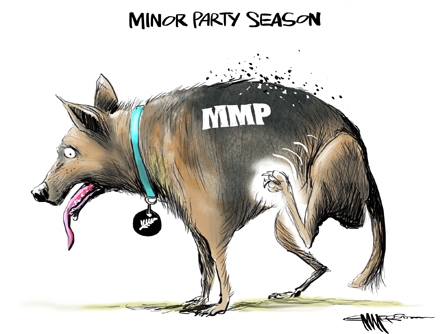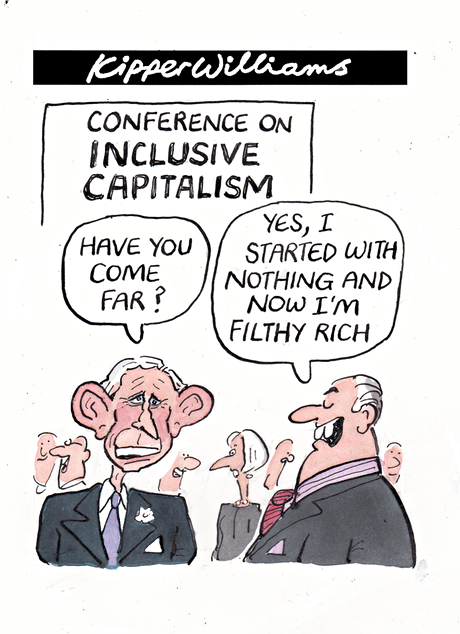
Here's my Top 10 items from around the Internet over the last week or so. As always, we welcome your additions in the comments below or via email to bernard.hickey@interest.co.nz.
See all previous Top 10s here.
My must-read today is #8 for a good summary of what is going wrong in Europe, and why, for example, the ECB has just cut its deposit rate to minus 0.1% (ie you pay the bank to look after your money)
1. Inequality and monetary policy - Bloomberg reports that European Central Bank Governing Council member Jens Nowotny has said central banks should keep an eye on the issue of growing inequality because it can cause financial instability.
The idea is that if middle to lower income earners borrow more to make up for falling real incomes then that could create asset bubbles and high debt.
That may not be such an issue here, but it's fascinating that central banks, rightly, are now paying a lot more attention to the issue of debt and asset prices.
In the past central banks only seemed to care about inflation (in our case) and maybe employment.
Now they rightly realise that build-ups of debt can cause financial and economic instability that affects the real world.
“Monetary policy makers, including also the IMF, are paying more attention to questions of inequality, because we’ve seen that distribution can have effects that are relevant for monetary policy,” Nowotny said. “For instance, it was a key reason for the U.S. financial crisis that policy makers tried to solve the housing problem for lower income brackets not by social housing but by very cheap credit.”
2. Finally - US jobs figures out over the weekend showed jobs growth of 217,000 in May and that finally, after six years, US employment is back to where it was before the Great Recession. The chart below shows just how badly the US economy has fared relative to previous post-war recessions.
3. But the population rose 15 million in the same time - The New York Times' Neil Irwin also looks at this jobs milestone of returning to pre-recession jobs levels of 138.5 million jobs, but points out that America's population rose 15 million over the same time.
Not only is unemployment higher, but the percentage of working age people looking for work is near record lows.
Also:
And consider wages. The average private-sector worker took home $838.70 a week in April. In January 2008, if you use April 2014 dollars, that was $818.31. In other words, in the last six and a half years, the average private-sector American worker has seen a total inflation-adjusted pay increase of only 2.5 percent, a lousy $20 a week.
4. And don't forget inflation - Wonkmonk points to a Josh Bivens piece in the WSJ that busts the myth that US inflation has been caused by unjustified wage growth. Turns out it's unjustified expansion of profit margins. No wonder the Piketty talk is getting such traction.
Much recent discussion about potential price inflation seems to take as a given that it would be sparked by a pickup of wage growth. But looking at data from the non-financial corporate sector–which accounts for well more than half of all private-sector economic activity and for which rich data are available–what’s really striking about price growth since the end of the Great Recession is how much of it has been driven by risingprofits, not rising labor costs. In fact, labor costs have been essentially flat between the end of the Great Recession and the first quarter of 2014.
Profits earned per unit sold, on the other hand, have been rising at an average annual growth rate of nearly 9% since the recovery’s beginning. To the degree that there is any inflationary pressure in the U.S. economy over that time, it is surely not coming from labor costs.
5. 'Naked civil servants' - BBC reports on a crackdown going on China to stop corrupt officials laundering their proceeds via family members living overseas.
This is all part of the 'tigers and flies' corruption crackdown launched by new leader Xi Jingping over the last year that has, ironically, sparked a rush of money out of China by those keen to ensure the Government doesn't take it off them. It's being invested in properties all over the world.
An investigation in China has revealed that more than 1,000 officials in the southern province of Guangdong have spouses or children living abroad. China's communist leaders want to stamp out the practice because they believe it is linked to corruption. The practice is not illegal but gives corrupt officials a route to send abroad any money obtained illegally. Guangdong bureaucrats were told to bring their families home, quit their jobs or face demotion.
China's state-run news agency, Xinhua, said the communist party in Guangdong had carried out a two-month investigation into a group known as "naked officials". The name is applied to Chinese civil servants who have sent family members to live abroad. Some then funnel ill-gotten gains to these overseas relatives, leaving the bureaucrats with few assets in China - or "naked". About 200 Guangdong officials had already asked their families to return to China, Xinhua said. Another 866 had agreed to accept demotion, including nine at mayoral level.
6. Fraudulent metal warehousing and financing - There's been a lot of talk lately about how many commodities are stockpiled in China to use as collateral for lending on all sorts of other activities, including property development.
Now the Chinese authorities are cracking down on this. Luckily, for us, the Chinese appear not to be using milk powder as collateral for such practices. The Australians, who export iron ore, may not be so lucky. It's worth keeping an eye on this. Unfortunately for the coal miners on the West Coast, the slump in the iron ore price in recent months has coincided with a fall in coking coal prices.
Here's the WSJ report:
Banks looking into suspected fraud involving metals stored in China as collateral for loans are expanding their probe into more warehouses amid worries the problem is more widespread, according to people with knowledge of the matter.
A half-dozen banks, including Citigroup Inc and Standard Chartered, provided loans to trading firms that were backed by metals such as copper and aluminum stored at one of China's biggest ports, the people said.
The trading firms hold the deed to the metal, which can be used to secure financing, but the metal stays in a warehouse. Banks fear a private Chinese company may have used the metal as collateral to get multiple loans, potentially defrauding the lenders and trading firms.
If the problem is more widespread, banks could cut back on financing for commodities in China, cutting demand and roiling global markets.
7. Keep an eye on this - Here's Claude Russell writing via Reuters about the practice of using commodities in China as a fiancing tool and why it matters a lot to the Australians.
It was revealed this week that banks and trading houses are checking their exposure to metal financing at Qingdao, the world's seventh-largest port, amid concern that single cargoes of metal have been used several times to obtain financing. This means there are potentially cargoes with more than one owner, raising the possibility of defaults on loans and complex legal actions.
The authorities have yet to confirm they are investigating, but it seems more likely than not that any foul play will convince them to crack down further on the shadow banking system. For physical commodities, the increasing concern over financing means that Chinese markets may be disrupted in the short term, especially if there is distressed selling of stocks.This may serve to dampen imports for a few months as the inventory overhang is worked through, but thereafter the market should be more reflective of actual supply and demand.
Iron ore would appear to the commodity currently most vulnerable in the short term, given the high inventories at Chinese ports, the softer economic growth being experienced and the weak spot prices.
8. What went wrong in Europe - Former senior EU adviser Philippe Legrain writes a good summary via Project Syndicate of what went wrong in Europe and why nationalists and extremists did so well in last month's elections.
There are many reasons for this political earthquake, but the biggest are the enduring misery of depressed living standards, double-digit unemployment rates, and diminished hopes for the future. Europe’s rolling crisis has shredded trust in the competence and motives of policymakers, who failed to prevent it, have so far failed to resolve it, and bailed out banks and their creditors while inflicting pain on voters (but not on themselves).
The crisis has lasted so long that most governing parties (and technocrats) have been found wanting. In the eurozone, successive governments of all stripes have been bullied into implementing flawed and unjust policies demanded by Germany’s government and imposed by the European Commission. Though German Chancellor Angela Merkel calls the surge in support for extremists “regrettable,” her administration – and EU institutions more generally – is substantially responsible for it.
9. Totally John Oliver on Tony Abbott. I laughed a lot.
10. Totally Clarke and Dawe on a lack of gruntle in the Australian electorate.
7 Comments
#2, job quality? ie everyone working in McD's today isnt the same thing as 2007.
regards
#5 the rush of money out of China by those keen to ensure the Government doesn't take it off them. It's being invested in properties all over the world
Relax Bernard - it can't possibly be happening
It's like climate change and Co2, if you can't see it, it can't be happening - especially in New Zealand - We know, because our leaders keep telling us it isn't so
#8 Greece really is seeing the rise of a Nazi party, not just a far-right one.
http://www.theguardian.com/world/2014/jun/07/greece-golden-dawn-fascism…
#5 Here’s an old zerohedge article (Here) describing the confiscation of 14.5 BILLION USD from one single corrupt official. Jim Rickards in his new book “The Death of Money” describes what’s going on in China as “One of the greatest episodes of capital flight in human history”. It is utterly incomprehensible to think New Zealand is immune. We have almost zero foreign buyer restrictions and no capital gains tax (not that that would make any difference). There’s even a government subsidy so that poor tenants can afford to pay the landlord elevated private market rates. How many double grammar zone houses, St Heliers, Kohimarama, Remuera, Mission bay houses are being turned over to foreigners. The next generation of New Zealands will have to rent off foreigners if they want to send their kids to decent schools. Its disgusting!
"central banks should keep an eye on the issue of growing inequality because it can cause financial instability."
They don't care. Their only concern is protecting the wealth and power of the ultra rich. They are returning the West to something of an 18th Century arrangement with a parasitic rentier class sucking the life blood out of an economy made up of powerless subsistence level debt serfs.
Three minutes of George Carlin in support of your statement:
#4 - the first thing I thought was along the lines of "corporations don't eat" - they have a different set of purchasing priorities, e.g. capital, as opposed to a household, which would typically be food, housing and energy. In the very first paragraph, they mention food and energy are not included, so as far as individuals are concerned it's a pretty pointless analysis. It doesn't debunk wage inflation either, it merely says there haven't been significant increases in labour costs. If there WAS significant wage inflation, i'd be surprised not to see more significant price inflation, similar to what we saw here during the mid 2000's.
The article's real point seems to be that wages are not keeping up with corporate profits, nothing to do with inflation.









We welcome your comments below. If you are not already registered, please register to comment
Remember we welcome robust, respectful and insightful debate. We don't welcome abusive or defamatory comments and will de-register those repeatedly making such comments. Our current comment policy is here.